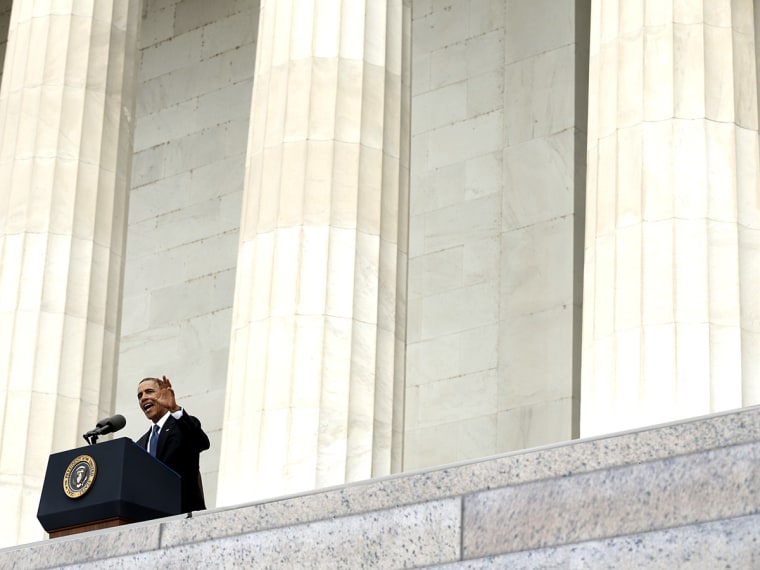White House officials have said that President Obama is prepared to follow through with military action on Syria even as a British measure to do so failed in parliament Thursday night and new polling showed Americans against it.
Senior Obama administration officials briefed congressional leaders on Syria Thursday night as it worked to shore up support for the strike.
New York Democrat Eliot Engel of the House Foreign Affairs Committee told NBC News that during the 90-minute call, Obama administration officials told members of Congress they had intercepted "communications from high level officials" proving the Bashar al-Assad regime was responsible for the most recent chemical weapons attack in Syria.
Engel also said the administration pointed toward "movement of personnel around Damascus just prior" to the attack as evidence that "would be in line with chemicals about to be used."
The White House sought to stress its efforts on collaboration with lawmakers, some of whom have rebuked the administration for not seeking a vote. "The views of Congress are important to the president's decision-making process, and we will continue to engage with members as the president reaches a decision on the appropriate U.S. response to the Syrian government's violation of international norms against the use of chemical weapons," it said in a statement after the call.
Obama's efforts to build an international coalition have been blocked. On Thursday the British Parliament rejected a motion to allow military action--a slap at the president and his closest ally, Prime Minister David Cameron. A UN Security Council resolution to act against Assad would likely be stopped by Russia and China. But Obama may find support in France. President Francois Holland seemed to support a military strike, saying in an interview with French paper Le Monde that the Syrian regime "must not go unpunished" for the suspected chemical weapons attack and that France is among those ready to strike.
After the British vote, the White House made clear that it was disappointed but not deterred. “President Obama’s decision-making will be guided by what is in the best interests of the United States," said the statement. "He believes that there are core interests at stake…and that countries who violate international norms regarding chemical weapons need to be held accountable.”
Although several Democratic lawmakers issued statements of support after the group call, skepticism in Congress about any U.S. involvement in Syria may be growing.
There's no reason to think the American public is eager to engage in Syria, especially when the region is already unstable. Fifty percent of Americans opposed U.S. military intervention in Syria, according to a NBC poll released Friday. And Obama hasn't articulated a persuasive argument for U.S. military involvement--especially if it would be unilateral.
Nancy Pelosi issued a statement describing the briefing as "informative and beneficial." But she said she agreed with Speaker Boehner that more "consultation" and "additional transparency" were necessary, and "the case needs to be made to the American people [who are] weary of war."
She said she had expressed appreciation for the "measured, targeted and limited approach the president may be considering."
That last phrase may be key. In other words, Pelosi (and others on the call) may have gotten the picture that Obama has already decided to go ahead with a "targeted and limited" strike against the Syrian military--whether or not he has anybody else's support.
It's unclear whether a strike without Congress's consent would be legal but the murky technicalities may not actually matter.
Public opinion is another issue.
“When we take what is a very difficult decision, you have to have buy-in by members and buy-in by the public,” Representative Mike Rogers, the Michigan Republican who is chairman of the House Intelligence Committee, said Thursday on MSNBC. “I think both of those are critically important and, right now, none of that has happened.”
Earlier this week House Speaker John Boehner sent Obama a letter asking him to “make the case to the American people and Congress for how potential military action will secure American national security interests, preserve America’s credibility, deter the future use of chemical weapons, and, critically, be a part of our broader policy and strategy.”
Other lawmakers also warned the president to back off. “Engaging our military in Syria when no direct threat to the United States exists and without prior Congressional authorization would violate the separation of powers that is clearly delineated in the Constitution,” said a letter signed by 98 House Republicans and 18 Democrats.
Prime Minister Cameron faced similar resistance from his government. He made the case for intervention in Syria to Members of Parliament in an emergency session. But he admitted there was "no smoking piece of intelligence" about the chemical attack, and the motion to set the stage for possible action was defeated, 285 to 272.
Cameron said he strongly believed “in the need for a tough response in the use of chemical weapons but I also believe in respecting the will of this House of Commons.” It is clear that Parliament “does not want to see British military action [in Syria],” he said. “I get that, and the Government will act accordingly.”
President Assad has remained defiant, continuing the battle against rebels that has killed more than 100,000 Syrians in the last two and a half years.
“Failure awaits the United States as in all previous wars it has unleashed, starting with Vietnam and up to the present day,” he warned the U.S. in an interview with a Russian newspaper published Monday.
Assad called U.S. claims that his regime launched a chemical attack outside a Damascus suburb last Wednesday “nonsense” and “an insult to common sense.” He charged the West with drumming up the charge as a politically motivated attack.
